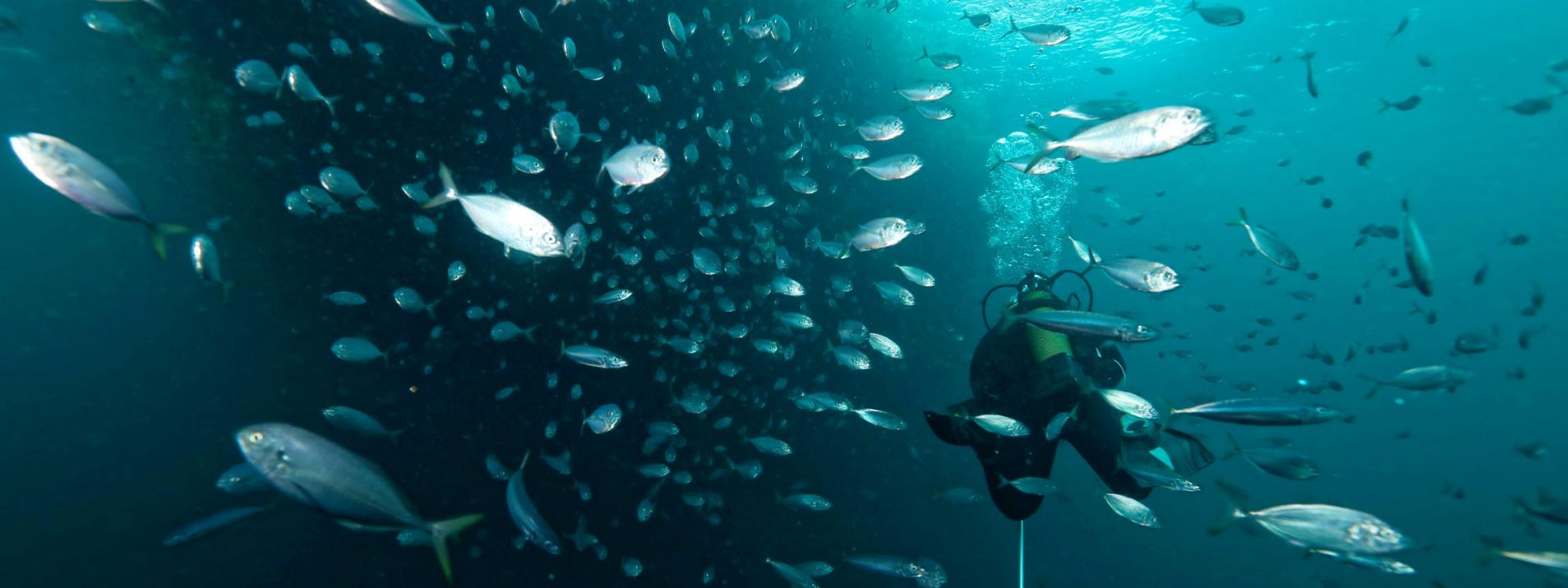Excess carbon dioxide in the sea is using all the seafloor calcite that has helped maintain pH levels for millennia, says the study published in PANS
By DTE Staff
 in the northwest Atlantic Ocean, adjacent to Europe, 40 to 100 per cent of the seafloor has been dissolved at the most severe locations. Credit: Getty Images in the northwest Atlantic Ocean, adjacent to Europe, 40 to 100 per cent of the seafloor has been dissolved at the most severe locations. Credit: Getty Images
in the northwest Atlantic Ocean, adjacent to Europe, 40 to 100 per cent of the seafloor has been dissolved at the most severe locations. Credit: Getty Images in the northwest Atlantic Ocean, adjacent to Europe, 40 to 100 per cent of the seafloor has been dissolved at the most severe locations. Credit: Getty Images
Scientists have observed that the dissolution of calcium carbonate sediments deep in the sea is happening on such a significant level that the calcite may not be able to regulate enough man-made CO2.
A study published in the Proceedings of National Academy of Sciences says that manmade carbon emissions are acidifying the ocean so rapidly that the seafloor is disintegrating.
An acidic can threaten marine life species such as corals, which are the lifeline for around 1/4th of all marine species.
The disintegration at a fast speed is unusual because a foundational chemical reaction that keeps the oceans at pH levels that are conducive to life is being thrown out of whack, explains a news report.
The researchers explain that calcium carbonate is still dissolving carbon dioxide in the water. This means there is still a chemical force fighting against ocean acidification. However, if humans continue to emit carbon dioxide at the current levels, there may be more CO2 in the oceans than before, making the sea extremely acidic.
The ocean floor is lined by calcium carbonate, or calcite. The reaction of calcite with carbon dioxide and water produces calcium ions and bicarbonate ions that have been balancing the pH levels for millennia.
The excess carbon dioxide uses all of the seafloor calcite to trigger these reactions in extremely large amounts. This dissolves the ocean floor as it creates more carbon dioxide than calcite.
The resultant acidity is likely to be extinct due to this as they need the particular range of pH levels. An imbalance for a long period of time means dooms for life in the sea such as fish, bacteria, molluscs.
The study adds that in the northwest Atlantic Ocean, adjacent to Europe, 40 to 100 per cent of the seafloor has been dissolved at the most severe locations. The news article says that the dissolution is worst in the northwest Atlantic.
What happens to the pH of the seawater if you increase the concentration of CO2 in seawater?
The ocean’s average pH is now around 8.1 , which is basic (or alkaline), but as the ocean continues to absorb more CO2, the pH decreases and the ocean becomes more acidic.
What happens to the pH of the ocean in the process of acidification the pH?
First, the pH of seawater water gets lower as it becomes more acidic. Second, this process binds up carbonate ions and makes them less abundant—ions that corals, oysters, mussels, and many other shelled organisms need to build shells and skeletons.
How does the ocean maintain its pH?
Thus, the buffering capacity of the ocean, or its ability to resist a change in pH, is actually quite large. In general, the ocean contains around 38,000 gigatons (or 38 billion tons) of bicarbonate, carbonate, and carbonic acid. This means that the entire ocean can absorb a lot of CO2 without becoming too acidic.
How does lower pH decrease available carbonate ions in the ocean?
When CO2 is absorbed by seawater, a series of chemical reactions occur resulting in the increased concentration of hydrogen ions. This increase causes the seawater to become more acidic and causes carbonate ions to be relatively less abundant.
Why increased CO2 concentration in water leads to decreased pH?
As mentioned, when carbon dioxide is dissolved in water, the release of hydrogen ions in carbonic acid is what lowers the pH. As CO2 levels increase around Earth, the amount of dissolved CO2 also increases, which increases the amount of carbonic acid, therefore decreasing the pH.
What effect will increasing CO2 levels have on ocean pH and why?
Carbon dioxide reacts with sea water to produce carbonic acid. The resulting increase in acidity (measured by lower pH values) changes the balance of minerals in the water.
Does carbonation lower pH?
Unfortunately, carbonic acid does have another effect. It decreases the pH level of the water. These solutions lower pH levels mean that they are more acidic, prompting people to ask whether sparkling water is harmful to their teeth.
How much does CO2 lower pH?
If we then add CO2 to 28ppm your pH would drop to 6.2, a change of 0.8. One possible explanation for this myth is that many copies of this pH chart skip some of the higher pH values, for example, jumping from pH 7.4 to a pH of 8.0.
Is lower pH more acidic?
The lower the number (0-7), the more acidic it’s considered. And the higher the number (7 to 14), the more basic it is. The pH scale may seem small, but each whole number represents a ten-fold leap in concentration of either H ions or OH ions. For example, rain is slightly acidic with a pH that measures about six.
How do you keep pH stable with CO2?
A more stable way of applying CO2 is to apply it below the normal levels and apply it so it is present in the water 24/7. This makes for a much more stable pH in the tank. CO2 is not enough to influence a huge swing, and the water stays slightly acidic as CO2 is constantly being pumped to it 24/7.
Why does activated carbon increase pH?
Any activated carbon that is not acid-washed usually produces an initial effluent with a pH greater than 7. The actual rise in pH depends on several factors such as the ash content of the starting material, total dissolved solids (TDS) of the influent water, and pH of the influent water.
Does activated carbon raise or lower pH?
Filtration is one of the most common ways to make water alkaline. Filter technology is typically based on bioceramics or activated carbon, which can be used to chemically change water to increase its pH level and make it more alkaline.

Coral Reef Conservation / Climate Change,CO2, ocean floor, coral reef, Ocean acidification, Carbon Dioxide, Calcium
The Campaign – Blood Lions™
BLOOD LIONS OFFICIAL TRAILER
Award winning feature documentary
